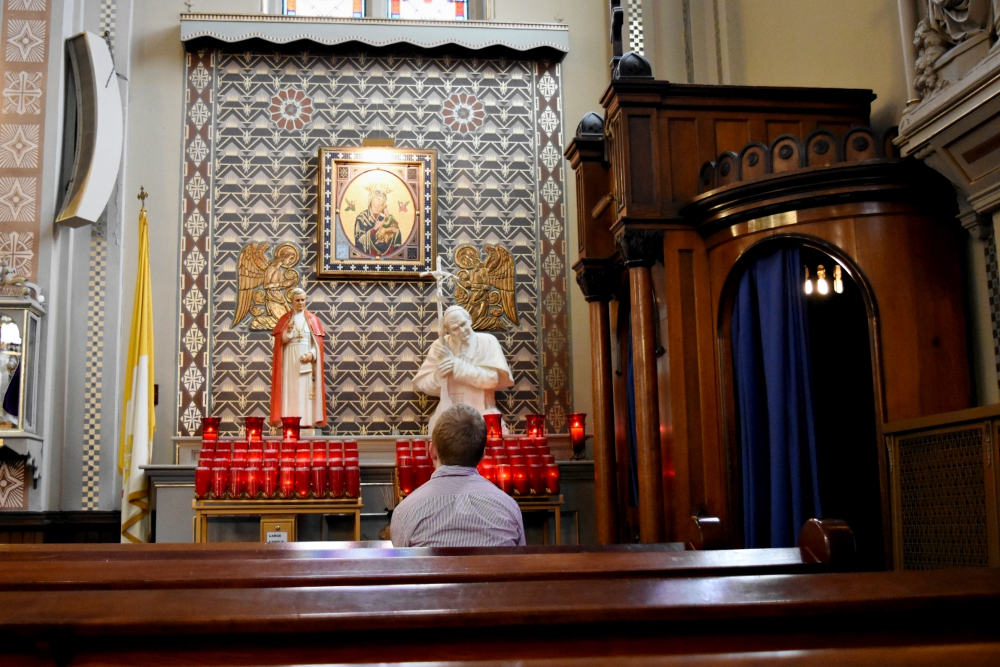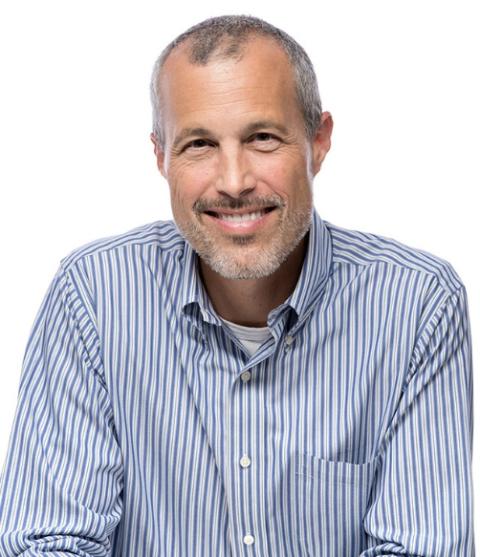
A man waits to go to confession at Old St. Mary's Church in Detroit in 2016. (CNS/The Michigan Catholic/Mike Stechschulte)
Workers of the world, most of you are bored and burnt out.
Gallup World Poll data collected across 155 countries indicates that 67 percent of employees have emotionally checked out of their jobs. Could these disgruntled workers include your pastor?
Matthew Bloom, associate professor at the University of Notre Dame and leader of the Wellbeing at Work program there, also runs Flourishing in Ministry, a program that researches job satisfaction issues among Christian clergy.
Bloom, who holds a doctorate from Cornell University and previously worked as a business consultant, studies all kinds of employees and their relationship to their jobs, including Christian ministers. And it is, he said, quite likely that your pastor is as affected by burnout as those in other professions.
Flourishing in Ministry studies the needs of church ministers of all Christian stripes, and works with clergy to find an answer to the work concerns that bother them.
"Most of what we're finding is that ministry work is getting more difficult," Bloom, who has been studying clergy work issues at Notre Dame since 2008, told NCR.
"The modern context is more demanding," he said, noting that pastors of all denominations are dealing with a more secularized culture and the threat of empty pews. A church is also in part a business, including financial issues and managing staffs, a process many pastors feel ill-equipped to deal with.
Still, modern ministers are relatively content. In comparison to two-thirds of secular workers, only a third of pastors admit to issues of burnout.
"The challenges of ministry are so steep. It is surprising to me that so many clergy are doing so well," said Bloom, whose program is funded by Lilly Endowment Inc., an Indianapolis-based concern with a special focus on religious issues.
One major source of clergy burnout is in the pews, said Bloom. Parishioners can be emotionally draining.
"The strongest advice we have is for parishioners," he said. They need to realize, "Your pastor is a person too. They could use your support and help."

Matt Bloom (University of Notre Dame/Matt Cashore)
Catholic parishes and Protestant congregations have more than their fair share of complainers, people who offer suggestions for improvement but rarely have a kind word for those in charge. "The priest hears more about what he's doing wrong than who he is helping," said Bloom.
Flourishing in Ministry offers suggestions to avoid burnout. Bloom said that studies indicated the need for pastors to step back more, examine what areas of their ministry bring joy and which ones bring stress and tension. In one article, he recommends at least 15 minutes a day for pastors to mentally step away from their work, as well as keeping to a vacation schedule.
Church bodies need to better address what Bloom calls "misalignment," or the appointment of pastors to communities that don't fit their personalities and skills.
It's a particular concern among Catholics, mixing pastors with a traditionalist bent in parishes with more liberal worshipers, or vice versa. Or sometimes an inexperienced pastor is placed in a large parish with varied ministries, led by a priest with no experience in operating large organizations.
Bloom, who was raised a Methodist, suggests that pastors step out of their role occasionally. He knows of a priest who joined a running group. There, he can be simply Joe, not Father Joe.
"It allows them to more fully express who they are," said Bloom.
In a consumer-oriented culture, pastors of all denominations are faced with churchgoers who expect to get the most out of their donations.
"I pay the bills. You have to do ministry the way I want to," is a prevailing attitude faced by pastors, said Bloom. But pastors were ordained to do ministry, not simply follow the demands of dues-paying clients, he said. In that way, church organizations are different than businesses. While churches contain elements of businesses, they remain a ministry. It is more than a simple client-customer relationship.
The growing ethnic diversity of churches offers another challenge to pastors. One pastor from a well-to-do family was placed in a poor, immigrant parish, and became frustrated with some of the practices of his parishioners. For one thing, they distrusted banks and hid their savings in their homes. He preached the Gospel of accumulating interest and federally insured savings, all to no avail. The issue of personal finances became an area of cultural contention between the pastor and his congregation.
Advertisement
While roughly a third of pastors face burnout issues, by contrast the vast majority remain happy in their jobs, a percentage far better than that experienced in the secular world.
Protestant clergy who are in good marriages have a natural support system that engenders contentment. But those in difficult marriages have the opposite problem. The healer often finds it difficult to find a listening ear, said Bloom.
Many celibate Catholic priests find the social support they need. Catholic pastors who are members of religious orders score particularly high on well-being scores, perhaps because they have a ready-made support system.
Whether celibate or married, male or female, Catholic or Protestant, job satisfaction among pastors, or lack thereof, remains a complex subject suitable to academic study, said Bloom.
Flourishing in Ministry is now exploring a wide gamut of issues, including the role of women in ministry; how African-American, Latino and minority pastors relate to their multi-ethnic congregations; clergy who lead parishes after secular careers; and, a growing issue among Protestant clergy, those who hold jobs outside their parish ministries.
[Peter Feuerherd is a correspondent for NCR's Field Hospital series on parish life and is a professor of journalism at St. John's University, New York.]
Editor's note: We can send you an email alert every time The Field Hospital is posted. Go to this page and follow directions: Email alert sign-up.








